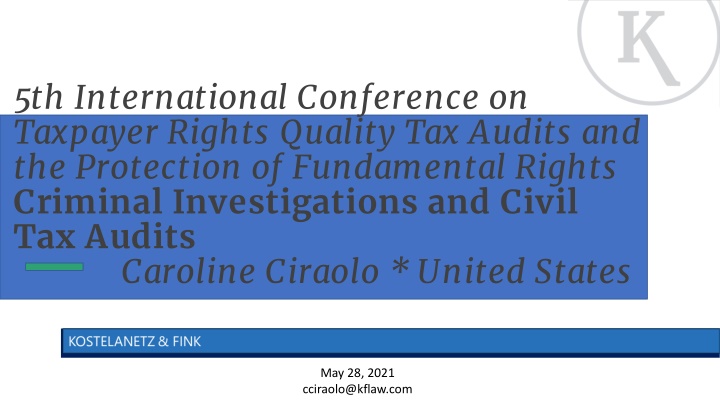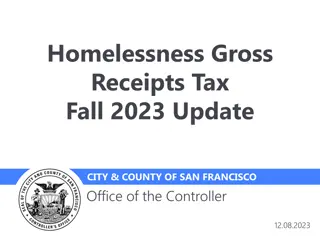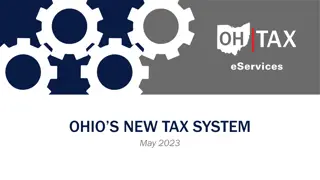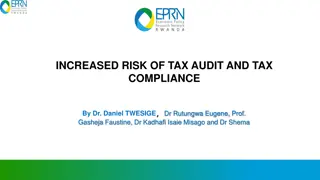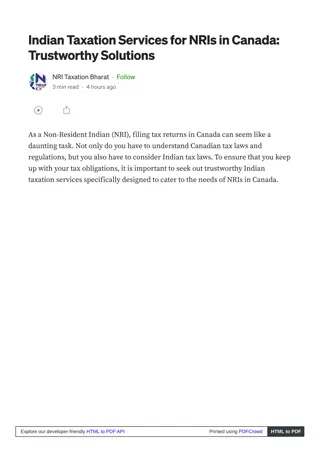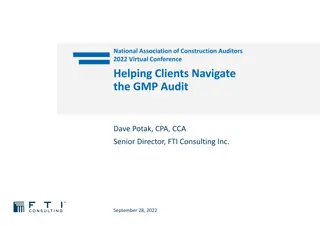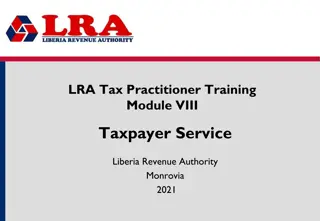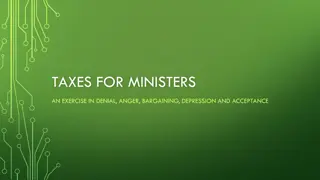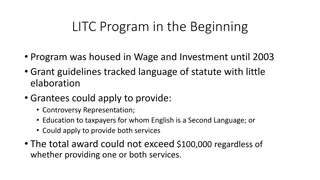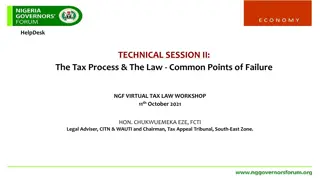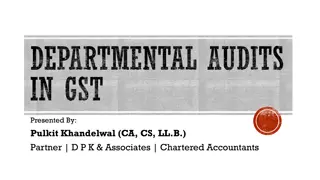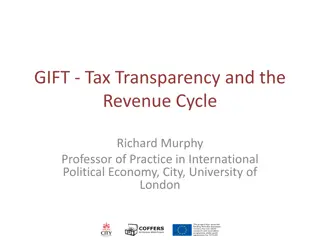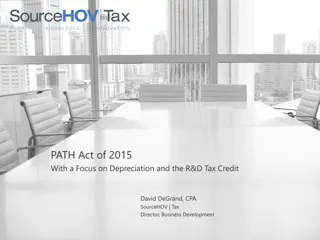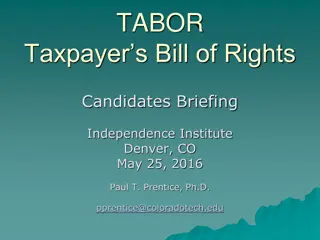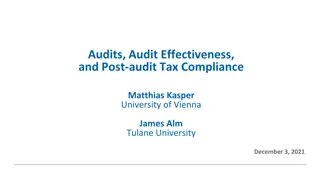International Conference on Taxpayer Rights & Tax Audits
Caroline Ciraolo, a prominent tax attorney, specializes in federal and state tax controversies, criminal investigations, and civil tax audits. She is recognized for her expertise and leadership in the field.
Download Presentation

Please find below an Image/Link to download the presentation.
The content on the website is provided AS IS for your information and personal use only. It may not be sold, licensed, or shared on other websites without obtaining consent from the author.If you encounter any issues during the download, it is possible that the publisher has removed the file from their server.
You are allowed to download the files provided on this website for personal or commercial use, subject to the condition that they are used lawfully. All files are the property of their respective owners.
The content on the website is provided AS IS for your information and personal use only. It may not be sold, licensed, or shared on other websites without obtaining consent from the author.
E N D
Presentation Transcript
5th International Conference on Taxpayer Rights Quality Tax Audits and the Protection of Fundamental Rights Criminal Investigations and Civil Tax Audits Caroline Ciraolo * United States May 28, 2021 cciraolo@kflaw.com
Caroline Ciraolo Caroline D. Ciraolo, former Acting Assistant Attorney General of the U.S. Department of Justice s Tax Division, is a partner with Kostelanetz & Fink and a founder of its Washington, D.C. office. Her practice focuses on federal and state civil tax controversies, including representation in sensitive audits, administrative appeals, and litigation, providing related tax advice, conducting internal investigations, and representing individuals and entities in criminal tax investigations and prosecutions. Caroline is President of the American College of Tax Counsel and Chair of the ABA Tax Section s Civil and Criminal Tax Penalties Committee. She is a recipient of the IRS Chief Counsel Award and the ABA Tax Section s Janet Spragens Pro Bono Award. Caroline serves as an Adjunct Professor at the Georgetown University Law Center (Criminal Tax Law & Procedure, International Tax Controversies) and University of Baltimore School of Law Graduate Tax Program (Investigation, Prosecution, and Defense of Tax Crimes, Tax Practice & Procedure). Caroline has been recognized by Chambers, International Tax Review, Best Lawyers in America, Super Lawyers, and The Daily Record s Top 100 Women Circle of Excellence. 2/26/2025 KOSTELANETZ & FINK, LLP 2
Topics Tax Avoidance v Tax Evasion (intent and willfulness) U.S. Focus on Fraud and Enablers U.S. Sentencing Guidelines and Factors Considered in Punishment U.S. Parallel Proceedings New U.S. Anti-Money Laundering Legislation 2/26/2025 KOSTELANETZ & FINK, LLP 3
Tax Avoidance v Tax Evasion Anyone may arrange his affairs so that his taxes shall be as low as possible; he is not bound to choose that pattern which best pays the treasury. There is not even a patriotic duty to increase one s taxes. Over and over again the Courts have said that there is nothing sinister in so arranging affairs as to keep taxes as low as possible. Everyone does it, rich and poor alike and all do right, for nobody owes any public duty to pay more than the law demands. Gregory v. Helvering, 69 F.2d 809, 810 (2d Cir. 1934), aff d, 293 U.S. 465 (1935). 2/26/2025 KOSTELANETZ & FINK, LLP 4
Tax Avoidance is Legal Making use of tax deductions and credits to reduce taxable income. These include various business expenses, tuition costs, medical expenses, and charitable donations. Making use of tax deferral plans to delay the payment of taxes. For example, an individual retirement account allows deferral of tax on invested funds until funds are withdrawn. Using employee retirement plans to protect revenue from being taxed. Becoming a tax resident or citizen of a low-tax jurisdiction. Making use of different tax-efficient financial vehicles such as private companies, trusts, foundations etc. Gifting wealth to heirs so as to reduce the amount of estate tax. There are also other effective estate planning methods to reduce taxes, such as using tax-efficient trusts. 2/26/2025 KOSTELANETZ & FINK, LLP 5
Tax Evasion is Illegal Deliberately under-reporting or omitting income. Keeping two sets of books and making false entries in books and records. Claiming false or overstated deductions on a return. Claiming personal expenses as business expenses. Hiding or transferring assets or income. Engaging in a "sham transaction." 2/26/2025 KOSTELANETZ & FINK, LLP 6
U.S. Focus on Fraud and Enablers IRS Fraud Enforcement Office In addition to leveraging existing law enforcement relationships, [Damon] Rowe will have a continued focus on unscrupulous activities of taxpayers and professional enablers that undermine our Federal Tax Laws in a manner that is consistent and fair to the American public. With additional training, resources and applied analytics, SB/SE will thwart emerging threats as it relates to fraudulent filings and related activities. IR-2020-49 (March 5, 2020) IRS Office of Promoter Investigations "By establishing the Office of Promoter Investigations, we are continuing our increased focus on promoters of abusive tax avoidance transactions, which we have demonstrated over the last year," said IRS Commissioner Chuck Rettig. "This office will coordinate efforts across multiple business divisions to address abusive syndicated conservation easements and abusive micro-captive insurance arrangements, as well as other transactions. IR-2021-88 (April 19, 2021) Joint Chiefs of Global Tax Enforcement (J5) The unique thing about the J5 is the operational collaboration between five countries on tackling professional enablers that facilitate offshore tax crime, cybercrime and the threat of cryptocurrencies to tax administrations, as well as making best use of internationally available data and technology. Hans van der Vlist, General Director FIOD (July 2, 2018) U.S. Department of Justice, Tax Division The defendants and their co-conspirators' criminal conduct enabled their clients to claim more than $1.2 billion in fraudulent tax deductions and generated hundreds of millions of dollars of tax loss to the United States, said Principal Deputy Assistant Attorney General Richard E. Zuckerman of the Justice Department's Tax Division. Their convictions signal just the beginning of the department s prosecutive efforts. Taxpayers engaging in such schemes, and the lawyers, accountants, appraisers and other professionals that enable them, should understand that they will be held fully to account for their fraudulent conduct. Press Release (Dec. 21, 2020) 2/26/2025 KOSTELANETZ & FINK, LLP 7
Principles of Federal Prosecution Justice Department commences or recommends federal prosecution if a person's conduct constitutes a federal offense, and that the admissible evidence will probably be sufficient to obtain and sustain a conviction, unless (1) the prosecution would serve no substantial federal interest; (2) the person is subject to effective prosecution in another jurisdiction; or (3) there exists an adequate non-criminal alternative to prosecution. Considerations in determining whether a prosecution would serve a substantial federal interest: 1. Federal law enforcement priorities; 2. The nature and seriousness of the offense; 3. The deterrent effect of prosecution; 4. The person's culpability in connection with the offense; 5. The person's history with respect to criminal activity; 6. The person's willingness to cooperate in the investigation or prosecution of others; 7. The person s personal circumstances; 8. The interests of any victims; and 9. The probable sentence or other consequences if the person is convicted. 2/26/2025 KOSTELANETZ & FINK, LLP 8
U.S. Sentencing Guidelines 2/26/2025 KOSTELANETZ & FINK, LLP 9
18 U.S.C. 3553(a) FACTORS TO BE CONSIDERED The court shall impose a sentence sufficient, but not greater than necessary, to comply with the purposes set forth in paragraph (2) of this subsection. The court, in determining the particular sentence to be imposed, shall consider (1) the nature and circumstances of the offense and the history and characteristics of the defendant; (2) the need for the sentence imposed (A) to reflect the seriousness of the offense, to promote respect for the law, and to provide just punishment for the offense; (B) to afford adequate deterrence to criminal conduct; (C) to protect the public from further crimes of the defendant; and (D) to provide the defendant with needed educational or vocational training, medical care, or other correctional treatment in the most effective manner; 2/26/2025 KOSTELANETZ & FINK, LLP 10
18 U.S.C. 3553(a) FACTORS TO BE CONSIDERED (3) the kinds of sentences available; (4) the kinds of sentence and the sentencing range established for (5) any pertinent policy statement (A) issued by the Sentencing Commission pursuant to section 994(a)(2) of title 28, United States Code, subject to any amendments made to such policy statement by act of Congress (regardless of whether such amendments have yet to be incorporated by the Sentencing Commission into amendments issued under section 994(p) of title 28); and (B) that, except as provided in section 3742(g), is in effect on the date the defendant is sentenced. (6) the need to avoid unwarranted sentence disparities among defendants with similar records who have been found guilty of similar conduct; and (7) the need to provide restitution to any victims of the offense 2/26/2025 KOSTELANETZ & FINK, LLP 11
Impact of Anti-Money Laundering Legislation On January 1, 2020, the Senate voted to override President Trump s veto of the annual military policy bill (the National Defense Authorization Act NDAA). Division E of the Act is the Anti-Money Laundering Act of 2020: The most significant changes to U.S. AML and financial crime regime since the USA PATRIOT Act. Part of the AMLA is the Corporate Transparency Act. Corporations and LLCs must disclose true, beneficial owners to FinCEN at formation Must provide Beneficial Owner s name, date of birth, current address, and driver s license or non-expired passport number. Widens the mandate and goals of the Bank Secrecy Act to include national security. Requires the risk-based approach for compliance programs. Expands duties, powers and functions of FinCEN Extends subpoena powers on foreign banks with U.S. correspondent accounts Increases civil and criminal penalties for violations of the BSA Requires multiple studies and reports that point to risk areas 2/26/2025 KOSTELANETZ & FINK, LLP 12
Parallel Proceedings Defined: Multiple investigations or litigations arising out of the same set of facts or transactions Brought by combination of government agencies civil, criminal, or administrative In tandem or in succession, addressing different public interests History: Criminal and civil investigations proceeded in seriatim, with referrals to civil enforcement many years later Civil referrals were often only made when evidence insufficient for indictment Parallel proceedings were authorized but not frequent Justice Department Policies in Tax Matters - Justice Manual 6-4.400 Consistent with the Department's policies for coordinating criminal, civil, and administrative actions, the Tax Division uses all available judicial remedies and procedures to enforce the tax laws. These actions include criminal prosecutions, civil injunction actions, summons enforcement actions, collection actions, and the defense of civil refund suits. The Government may take these actions simultaneously or sequentially. Today: Substantial increase in parallel proceedings Criminal investigations, civil audits and investigations, Congressional inquiries, etc. Civil proceedings often result in civil fraud penalties 75% of tax due and attributable to fraud 2/26/2025 KOSTELANETZ & FINK, LLP 13
